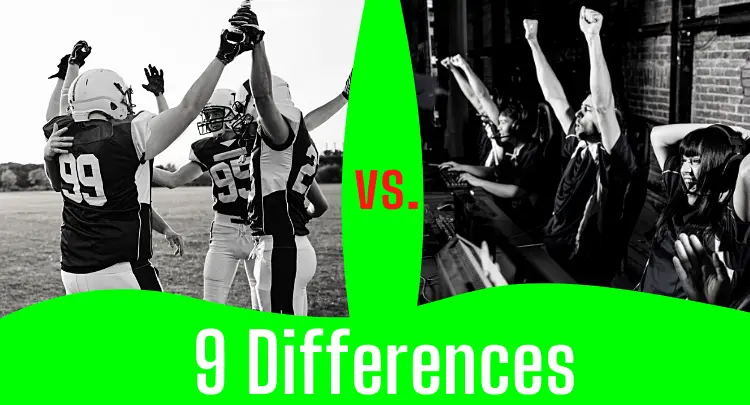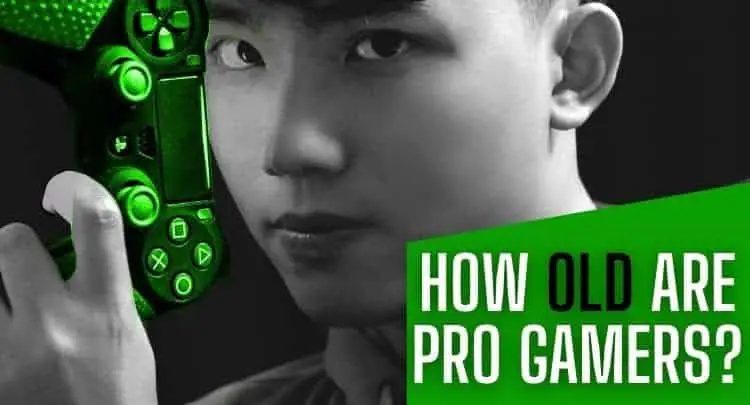Masakari and I got into Esports over 20 years ago. He became a pro gamer, and I took action as an organizational talent in the background. We entered this world with Counter-Strike, but of course, there were a lot of Esports-like events even before 1999.
In this post, I would like to give you a short outline of the development of our digital sport, which has arrived in the middle of society but is still only accepted by a few as a real sport.
- First Tournaments, but Don't Call it Esports, Please!
- The Seed of the Esports Plant Germinates
- From When on Did We Start Calling it Esports?
- When was the Term Esports Coined?
- Esports Becomes Real Sports
- Thesis: Esports Becomes the Future of All Sports
- What was the first esport?
- Who founded esports?
- In which country was esports first recognized as a sport?
- Final Thoughts on the History of Esports
- Top 3 Related Posts
Note: This article was written in English. Translations into other languages may not provide the same linguistic quality. We apologize for grammatical and semantic errors.
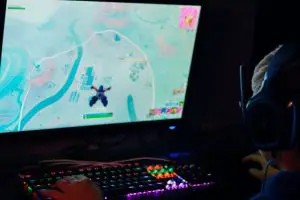
First Tournaments, but Don’t Call it Esports, Please!
In the beginnings of competitive gaming, the contests which were organized were small tournaments or small LAN parties. At this point, the prize money was relatively small, and there was not a proper league system for these events.
It is known from many classic games that spontaneous or planned competitions took place in universities or other places, sometimes organized by the game manufacturers. For example, Atari hosted a three-month event in 1980 with the game Space Invaders. Occasionally, world championships were also held.
However, this was very different from today’s Esports. The competitions were always single-player only.
There was no sponsoring, no live broadcasts, and no professional preparation in a team.
Ultimately, these were singularities in the gaming world that were prototypes. But, it went in the direction of professionalization with the spread of the Internet and the emergence of multiplayer network games in 1995.

Honest recommendation: You have the skill, but your mouse doesn't support your aiming perfectly? Never struggle with your mouse grip again. Masakari and most pros rely on the Logitech G Pro X Superlight. See for yourself with this honest review written by Masakari or check out the technical details on Amazon right now. A gaming mouse that fits you makes a significant difference!
The Seed of the Esports Plant Germinates
Game manufacturers realized the potential of digital sports in the 70s and 80s. With the development of multiplayer games in the 90s, such as MIDI Maze, Quake, Counter-Strike, and Unreal, there were more and more opportunities to compete with others.
Then, in 1994, as the Internet spread to the public, the incentive among gamers continued to grow. As a result, the first teams, so-called clans, were founded. Almost simultaneously, the first gaming communities were created, some of which then developed further into the first gaming leagues.
In the 90s, everything was still going wild, but the number of LAN parties increased, which organized tournaments with non-cash or cash prizes. By now, more often also with real sponsors from the software and hardware industry.
It could be said that in 1997 competitive gaming took on new forms that pointed the way toward today’s esports. Teams had to constantly collect points in leagues to play for prize money in the main event at the end. More and more ambitious teams were formed in the USA and Europe, and shortly before the turn of the millennium, also in Asia. But to call all this professional would be an exaggeration because it was only with the release of Counter-Strike that a trend began that enabled gamers to earn a living with gaming.
From When on Did We Start Calling it Esports?
In 1999, two developments collided. South Korea announced the hosting of the World Cyber Games the following year, and Counter-Strike rapidly conquered the first-person shooter scene. The built-in HLTV enabled relatively good live broadcasting of Counter-Strike matches.
In the beginning, only the direct followers of the competing teams watched, but soon there were also the first TV broadcasts.
With the enabling of public viewing and the corresponding design elements that also make such a broadcast interesting for viewers, the pressure on the players grew, and the ecosystem around them.
The former led to professionalization in the preparation of team matches. The first coaches, physiotherapists, and press conferences found their way into this new sport.
The latter allowed the fledgling organizations to build communities with financially strong investors and worldwide structures with merch and advertising.
So if you want to pin down the start of Esports, it’s certainly somewhere in the millennium.
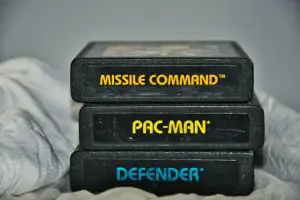
When was the Term Esports Coined?
The first time the term appeared publicly was on December 13, 1999, in a report on the website Eurogamer.net on the occasion of the founding of the Online Gamers Association (OGA).
The term Esports existed at latest since the founding of the Electronic Sports League (ESL) in 2000, but it did not catch on worldwide until much later.
In addition to Esports, i.e., electronic sports (also spelled eSports or E-Sports), terms such as virtual sports and digital sports also existed. Unfortunately, we are not aware of an older online source for the use of the term than on Eurogamer.net, nor are other sources such as Wikipedia.

Esports Becomes Real Sports
Fans and gamers alike argue that esports should be considered a real sport due to the physical exertion, teamwork, and time needed to play. Furthermore, they can be classified as a sport because they require coordination, dedication, and skill to perform at the highest level.
And this is correct, as many scientific studies show. (example source)
We have already dealt with this topic in more detail in this post:
In some countries, not many, esports is already accepted as a set of sports. Nevertheless, even today, there is still a doubt, especially among classic athletes and the older generations, whether Pro Gamers are real athletes.
But there is a lot of money and a lot of potential at stake. Many sports clubs have been setting up Esports departments and signing digital athletes for a few years now.
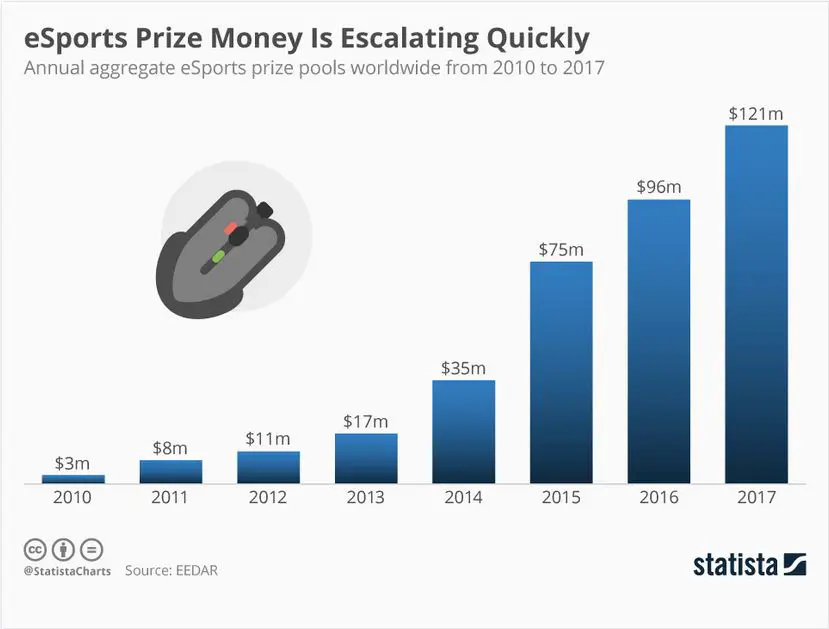
As the chart from Statista with data from EEDAR shows, prize money exploded from 2010 onwards, doubling in some cases within a year. We have not found any current figures, but it can be assumed that the rate of increase has continued in the same way. If we assume an increase of 20 percent annually, we would be at over $250m in 2021.
Esports is a huge growth market, and the traditional sports world is getting more and more used to its digital brother.
So we’re at a point today where Esports has the same level of professionalization as the traditional sports ecosystem.
Thesis: Esports Becomes the Future of All Sports
The predictions for the next few years show that Esports revenues will become the biggest in sports, reaching $1.8 billion by 2022 (Source: NewZoo).
And with mainstream broadcasting, new laws to protect players from being exploited, and a focus on improved physical conditions, Esports is becoming more and more accepted as a “real” sport.
Many traditional athletes openly show their preference for playing their sport as a video game on their social media accounts.
Athletes are role models, so more and more people are coming into contact with Esports earlier and earlier. A damn good thing.
The growth in Esports prize money shown above is also reflected in viewer interest.
Furthermore, the importance is also generally reflected in the growth of the gaming industry, which has long since left other entertainment industries behind. We have written about this in the article “Gaming Industry vs. Other Entertainment Industries“.
With streaming platforms like Twitch primarily focused on gaming, video games now come in all forms and skill levels 24/7.
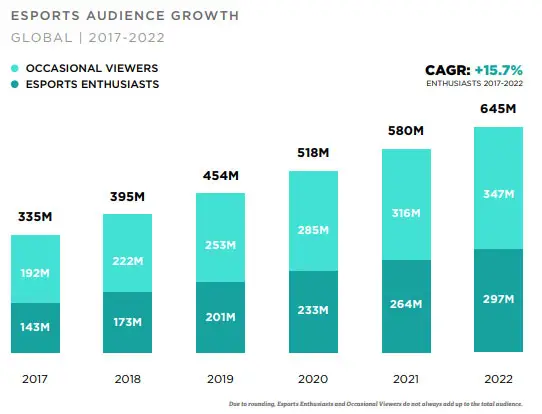
This helps keep people interested in this type of sport even when they are not playing.
Esports, unlike other traditional sports, can be played anytime and anywhere. Esports also brings in more fans by appealing to a wider variety of people with a wide variety of interests that they may have missed out on previously because they were too involved in another sport they loved. The newest games grab the most viewers.
And the advertising industry is also becoming increasingly interested in Esports. Very conservative companies are getting into esports with their advertising campaigns. So we are only at the beginning of enormous growth. As soon as Esports plays a role in the Olympics and larger and more powerful associations and leagues emerge, similar to the NFL, NBA, or FIFA, the gaming industry will experience another big boost.
Why is this good?
Listen to Masakari’s story about what he got for a top spot as a professional player 20 years ago. Spoiler: It wasn’t really possible to talk about financial gain.
If you compare that to today, for example, the millions in prize money in Fortnite, LoL, and Dota 2, and then imagine what would be possible if a lot of advertising money flowed into the ecosystem, you get an idea of why esports will leave all traditional sports behind for the foreseeable future. For pro gamers, that’s good news. However, for ambitious gamers starting in gaming today, the chances of making a living in gaming have never been higher. Beautiful times, aren’t they?
When we talk to interested people about esport, three questions usually come up. So here is a short FAQ:

Final Thoughts on the History of Esports
As with all topics related to digitalization, the development of Esports is also breathtakingly fast. What started 50 years ago with small tournaments is now a billion-dollar business and continues to grow.
With future technologies such as augmented reality and virtual reality, there are still more forms of Esports ahead of us.
But for now, let’s enjoy the here and now.
We can enjoy Esports in all its facets, follow along live and also aspire to a career ourselves at any time. As Masakari proves time and time again, an age beyond 30 is no barrier to making a foray into competitive gaming.
If you have a question about the post or pro gaming in general, write us: contact@raiseyourskillz.com.
GL & HF! Flashback out.

Michael "Flashback" Mamerow has been playing video games for over 35 years and has built and led two Esports organizations. As an IT architect and casual gamer, he is dedicated to technical topics.



